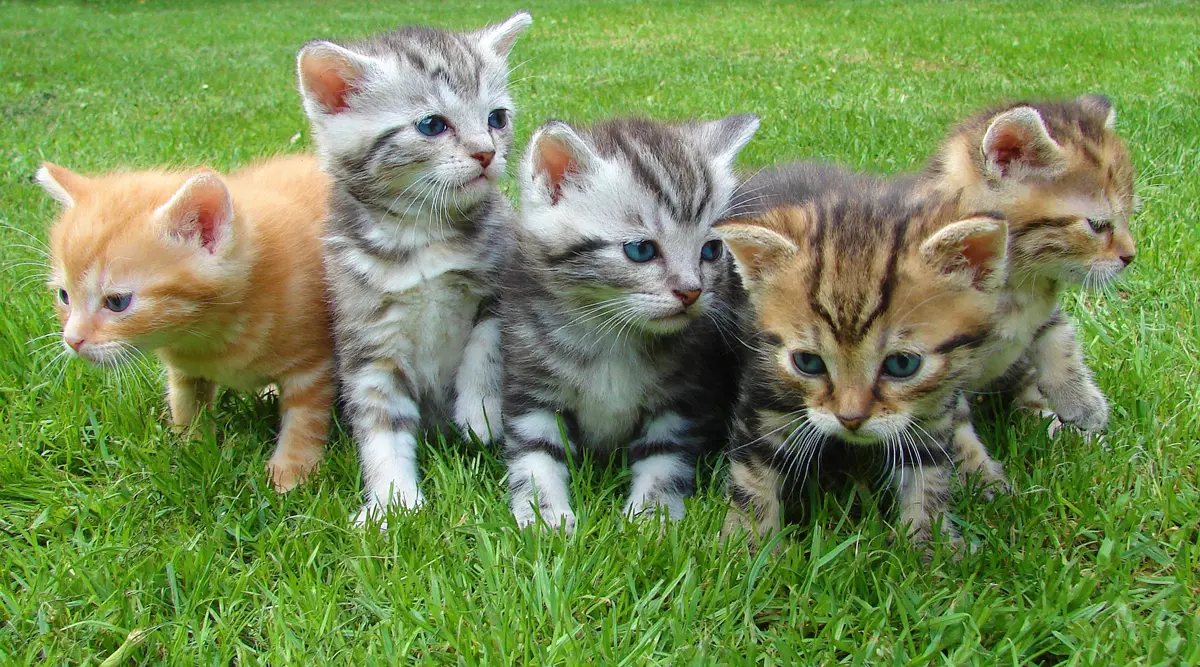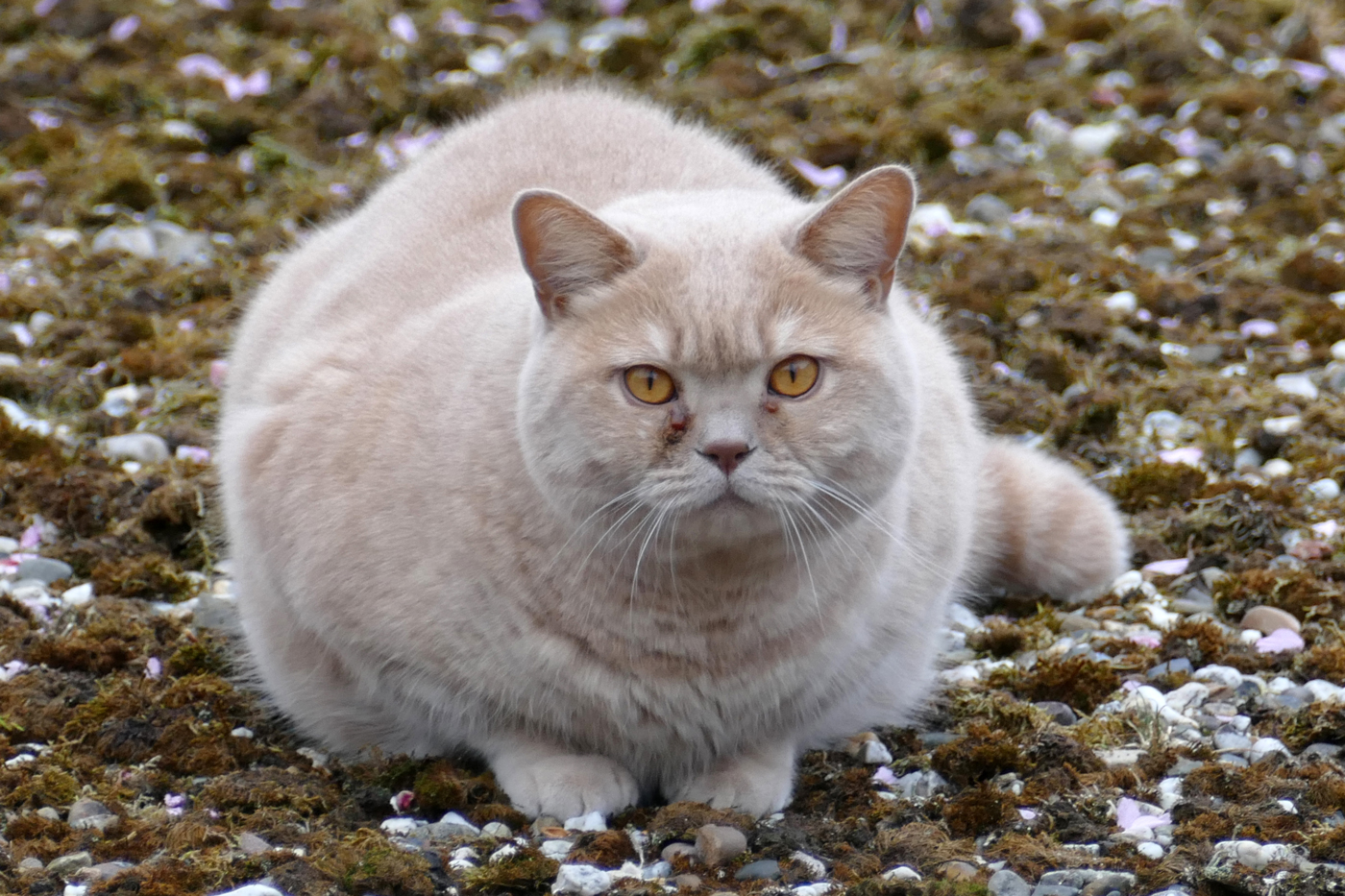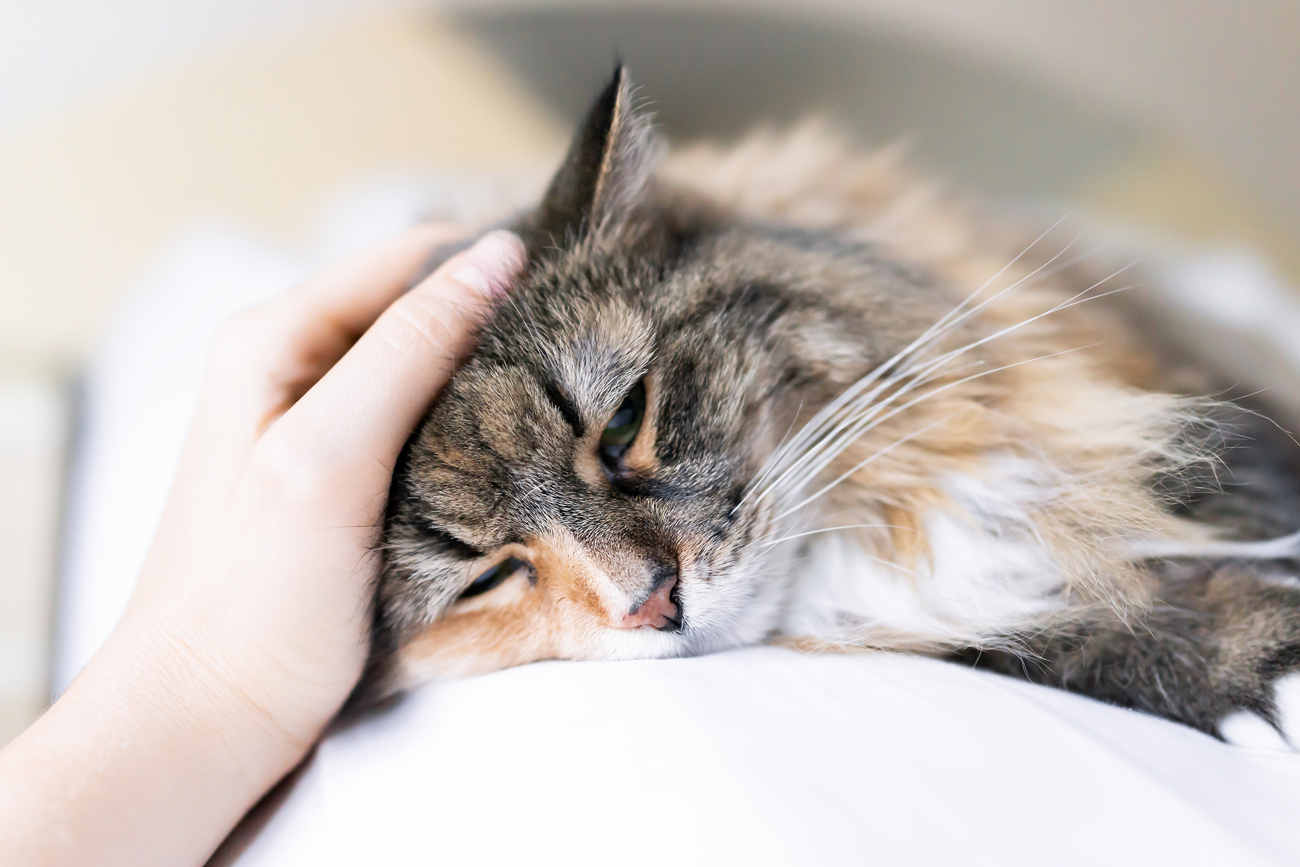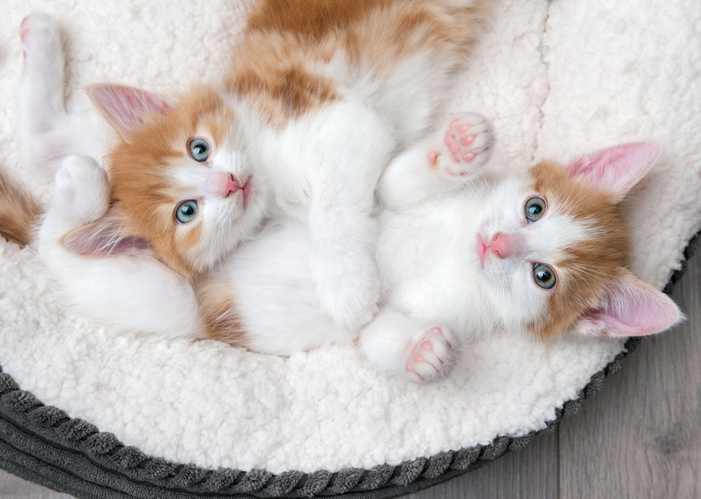How do I know if my cat is pregnant?
20th August, 2019

Whether you’re a new parent to your fur baby or you’ve had your kitty cat for a few years, you’ll know just how precious they are. One thing is for sure though, if you have a female cat and she’s yet to be spayed it’s important to be able to tell if she has become pregnant or not.
You may be purposely breeding her or it might be a total accident but, either way, there are a few tell-tale signs to look out for.
If you do find that your little tabby is indeed expecting, then it’s handy to know just how to take care of a pregnant cat. Purely Pets does not offer cover for accidents and illnesses that are pregnancy related.
Furthermore if your cat has had two or more litters, then this will be deemed as commercial breeding and in turn will be excluded from cover.
Did you know...
Did you know that a pregnant cat is called a queen? It’s a moniker you’ll probably come to agree with once you experience her demands throughout pregnancy.
Your little queen is likely to become more vocal or ask for affection to seek comfort or due to discomfort from her growing belly and potential false labour contractions.
How can you tell if your cat is pregnant?
Just like humans, felines have some tell-tale markers of being pregnant from behaviour to body changes and characteristic weight gain.
Your cat likely won’t show any signs of pregnancy in the first few weeks so if you do think she could have kittens on the way, it’s important to take her to your vet for confirmation.
In case you do not own a cat and instead a dog, read our recent blog to find out more details on how long a dog is pregnant for. You may also want to read about how you can offer the best care for a dog in season and how to help successfully breed a dog.
Here are just some of the symptoms to watch out for.
It’s all about the nipples
One of the first and most obvious indicators of pregnancy in your cat is changes to her nipples. Around two to three weeks into pregnancy your pussycat will start showing enlarged and red/pink nipples.
Morning sickness
Just like humans, cats can experience sickness during pregnancy. She might go through a phase of vomiting or lethargy.
It’s important to note that isn’t one of the most common signs and if your tabby does show signs of sickness, it's good to keep an eye on her; if it doesn’t pass quickly, be sure to take her to the vet.
Eating for two or three or more
Keep an eye on your cat’s feeding habits if you think she is pregnant – it will almost always change quite drastically.
If she is not experiencing sickness then it’s likely your furry friend’s appetite will increase enormously, especially towards the end of her pregnancy.
Remember, your cat can have several kittens so she’s not just eating for two!
Tubby tabby
The combination of growing unborn kittens and mama’s increased appetite will lead your cat to gain some weight; usually around 1-2kg depending on how many kittens she is carrying.
If her belly is rounded and swollen then this is a strong sign she is pregnant.
Nesting behaviour
Near the end of the pregnancy (around two weeks before her due date) you’ll notice your queen scoping out a quiet and comfortable spot around the house or a nearby barn.
She’ll possibly be dragging soft blankets, old towels, straw or scrap paper to make a cosy place to birth her kittens. If you see this nesting behaviour, help her out and line a cardboard box with newspaper or towels for her to use.

How long are cats pregnant for?
The gestation period for a cat is usually around 65 days though you might find for some cats this can vary between 61 and 72 days.
It’s best to confirm with your vet how far along she is before you start tracking the days.
How do you take care of a pregnant cat?
You’ve confirmed your precious pussycat is pregnant – congratulations! As the excitement subsides, you might be wondering just what extra care and preparations your little kitty might need to ensure she has a safe, happy and comfortable pregnancy.
Feeding and nutrition
A cat will need a lot more protein and energy to keep her strong throughout her pregnancy. Whilst normal adult cat food has kept her healthy until now, it won’t have the added nutrients she will need to grow her kittens.
It may actually be more beneficial to switch her back to kitten food throughout her pregnancy and until the newborn kittens have been weaned. However, make sure to seek advice from your vet if you are planning to make this change. It’s important to switch foods gradually with cats to avoid dodgy tummies and fussy eaters. It is always important to seek advice from your vet
Switching to kitten food has multiple benefits, not just for the pregnant cat but for the new kittens, too. They will get top quality milk from the extra nutrients their mum is consuming and, as they grow, they will start trying some of mum’s food, which will help them to wean a bit further down the line.
You might find that as her belly swells and is taken up by growing kitty cats, your pregnant cat can’t eat masses of food in one go, so small, frequent meals are the way to go.
It will be handy to leave out high-quality dry food for her to graze on throughout the day as she feels necessary.
As well as changing up their food, it’s vital that your cat has access to water throughout her pregnancy and as she nurses. Though once the kittens have been born this must be out of reach of the little ones to prevent them from drowning.
Handling and cuddling
From early on in her pregnancy a soon-to-be-mum cat will become more maternal and affectionate due to her hormones; she’ll show more love and look to you for comfort. Cuddles and affection are an important part of taking care of your pregnant cat and making her feel safe.
However, you need to remember that as her body changes you will need to watch how you handle her.
It’s important to avoid stroking a pregnant cat’s stomach as it can be sensitive and uncomfortable for her, as well as possibly unsafe for her unborn kittens.
Avoid picking her up unless it’s absolutely necessary, and if you have to do so it’s best to scoop her up under her bottom and steer clear of her belly.
Near the end of your cat's pregnancy, it’s best to discourage any boisterous activity – keep her calm and help her avoid stress.

Health and vaccinations
In theory, a healthy mum equals healthy kittens so it’s a good idea to make sure your cat is as fit as a fiddle before falling pregnant (easier said than done if you’re not actively planning to breed your cat).
In general, ensuring your feline friend is up to date with all her vaccinations is a good place to start as a mother passes on her immunity to her kittens in her milk.
If your kitty falls pregnant and her vaccines are due, or you’re unsure if she’s up to date or not, it’s always best to speak to your vet straight away. Some vaccines are not safe to administer during pregnancy; your vet will advise you on the best course of action.
In most cases, cats can still have safe pregnancies unvaccinated, though a few extra precautions may need to be taken.
Unborn kittens can very easily contract worms through their mum so it’s also important to keep your pussycat up to date with her worming treatment. The same goes for flea treatment.
Again, it’s vital to check in with your vet before giving any medication as they will be able to advise on the safest doses and treatments for both mum and kittens.
Remember to get your kittens adequate insurance for cats to make sure they’re all covered from 8 weeks old. It is important to note that vaccinations are not covered on insurance, only accidents and illnesses that are not related such as ear infections or diarrhoea.
Furthermore, you would need to be the owner and keeper of the kittens for standard insurance, but may need specialist insurance if getting this as a breeder who will be giving the kittens away.
Cleanliness and bathroom habits
Towards the end of your tabby’s pregnancy, there will be a few other things you need to watch out for and help her with. They can be a bit yucky but it’s all part and parcel of caring for your pregnant cat.
Given her increased weight and pressure on her bladder, your cat might not always make it to the litter tray in time. It’s unfortunate, but it’s not the time to tell her off; she really can’t help it. If you notice little accidents, just clean them up and carry on.
Depending on how big her belly swells she might also need help cleaning herself after using the loo; a gentle, wet cloth will do the trick if she lets you get close enough.
She might also be leaking milk as she nears labour. If this is the case, just be sure to clean it up and wash her blankets so she has a clean, warm and cosy space to lie down.
How do you prepare for a pregnant cat to give birth?
You might be nervous, excited or confused about how to help prepare your cat for birth. Rest assured, the cat kingdom has been birthing kittens in relative safety since the dawn of their species, but there are a few things you can do to help ensure a smooth delivery and prepare yourself for what’s to come in the weeks before birth.
Firstly, if you’re wondering how to tell when your cat is in labour, you can read about the signs and stages here. So if you feel as though your cat is in labour and you want to help assist as much as possible, read our quick guide on how to help your cat give birth.
Preparing yourself mentally
Yes, this is an important factor to a safe kitten delivery. If you are stressed, the mother cat will sense it. Keep calm no matter what happens, over the course of the pregnancy read up on what can be expected to happen during the birth so there are no surprises.
Note that you should not have to physically help your cat deliver her kittens, just take a step back and supervise, watching for any signs she’s running into trouble.
Preparing for the big day
One of the most important preparations for your pregnant cat is setting up a nesting box; you’ll probably notice near the end of her pregnancy she will start scouting out quiet places to give birth.
Give her a helping hand and set up a nesting box in a quiet room away from children and other pets a few days before expected delivery.
To do this, source a large cardboard box and either tip it on its side so it forms a little cave or carve out one of the sides so she can easily get in.
Fill the box with old (clean) towels, linen, newspaper or generally anything soft and absorbent you don’t mind throwing away afterwards. Layer it up until it’s thick and cosy.
Bear in mind that your cat might not actually use it – they are very strong-willed – however, if you limit her access to other potential birthing spots like dark cupboards, wardrobes or open drawers, she may well end up using your box.
Signs of labour
If you’re unsure what to look out for, here are a few signals that your cat will soon go into labour:
- About 24 to 48 hours before giving birth your kitty may be restless and obviously uncomfortable
- In the few days or a week before birth, the cat may well lose her appetite completely and stop eating
- Roughly 24 hours before birth your cat's temperature will drop significantly below 38°C
- She will get very loud, meowing more than usual but don’t panic, it’s normal and she’s just letting you know something is about to happen
How many kittens to expect
Most people know that feline litters usually consist of more than just one kitten but you’ll want to have an idea of how many to expect when your cat gives birth to make sure all have been delivered safely.
Typically, cats will have between four and six kittens in a litter and your vet should be able to confirm the actual number using an ultrasound or x-ray long before she gives birth.
If you are expecting a kitten, get a quote for cat insurance at Purely Pets and make sure your new arrival is covered from as early as 8 weeks old.
Helpful Pages
Recent Posts
Pet Insurance Quote
- 98% claims paid *
- Claims paid directly to vets
- 24/7 vet video consultations
- Interest free monthly payments




